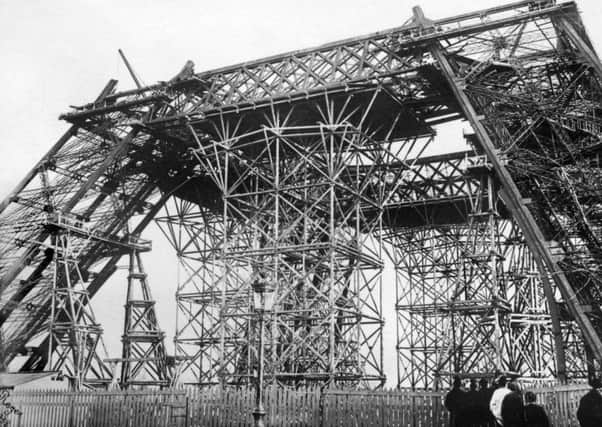On this day: Construction begins on Eiffel Tower in Paris


1547: Nine-year-old Edward VI succeeded Henry VIII as king of England.
1561: French persecution of the Huguenots was suspended by the Edict of Orleans.
Advertisement
Hide AdAdvertisement
Hide Ad1580: King James VI signed the Confession of Faith, later incorporated into the National Covenant of 1638.
1807: London’s Pall Mall was the first street in any city to be illuminated by gaslight.
1813: Jane Susten’s Pride and Prejudice was published by Thomas Egerton in the UK.
1829: William Burke, Irish body-snatcher, who joined William Hare in Scotland in selling bodies for research, and eventually murdering to supplement their stock, was hanged for his crimes. Hare escaped the gallows by turning king’s evidence.
1884: The first Ireland versus Scotland football international took place in Belfast. Scotland won 5-0.
1887: Construction work began on the Eiffel Tower in Paris.
1896: The first speeding fine was handed out to a British motorist, Walter Arnold of Kent, for exceeding 2mph in a built-up area. He was doing 8mph.
1902: Carnegie Institution was established in Washington DC.
1909: US control in Cuba ended.
1935: Iceland passed a law legalising abortion on medical/social grounds, the first country to introduce such legislation.
Advertisement
Hide AdAdvertisement
Hide Ad1953: Derek Bentley, 19, was hanged at Wandsworth Prison, despite much public protest. He and Christopher Craig, 16, had been found guilty of murdering a policeman, but Craig escaped the gallows because of his age. Bentley was pardoned in 1998.
1958: The Lego Company patented their design of Lego bricks, which are still compatible with the bricks produced today.
1959: Two women passengers and the driver died when a Glasgow tram caught fire after collision with a lorry.
1960: BBC broadcast the final episode of The Goon Show.
1961: Republic of Rwanda was proclaimed.
1986: The space shuttle Challenger exploded soon after lift-off from Cape Canaveral, killing the crew of seven including Christa McAuliffe, a woman schoolteacher selected as the first to fly in the “citizen in space” programme.
1990: Mr Justice Taylor’s report into Hillsborough disaster called for all-seater stadia by 1999 and tagging of football hooligans.
1997: Members of a Blairite group were accused of mounting a “sinister conspiracy” to take over the Scottish Labour Party.
1998: “Christ and the Woman of Samaria”, a black chalk drawing by Michelangelo, was sold for $7.4million to an unidentified telephone bidder at a Sotheby’s auction in New York.
2004: Gavyn Davies resigned as chairman of the BBC governors after the corporation was criticised and the government cleared by the Hutton report of “sexing up” a dossier on Iraq weapons of mass destruction. The BBC’s director-general, Greg Dyke, quit the next day.
ANNIVERSARIES:
Advertisement
Hide AdAdvertisement
Hide AdBirths: 1225 Saint Thomas Aquinas, Dominican friar and catholic priest; 1457 King Henry VII, founder of Tudor dynasty; 1582 John Barclay, Scottish satirist; 1822 Alexander Mackenzie, Logierait-born prime minister of Canada 1873 to 1878; 1841 Sir Henry Stanley, journalist and explorer who found David Livingstone; 1912 Jackson Pollock, painter; 1918 Harry Corbett OBE, puppeteer (The Sooty Show).
Deaths: AD814 Charlemagne, king of the Franks; 1547 King Henry VIII; 1596 Sir Francis Drake, voyager and pirate; 1725 Peter the Great, Tsar of Russia; 1829 William Burke, Edinburgh body-snatcher and murderer; 1983 Billy Fury, singer and film star; 2002 Astrid Lindgren, children’s author, creator of Pippi Longstocking; 2005 Jim Capaldi, musician and songwriter, co-founder of Traffic.